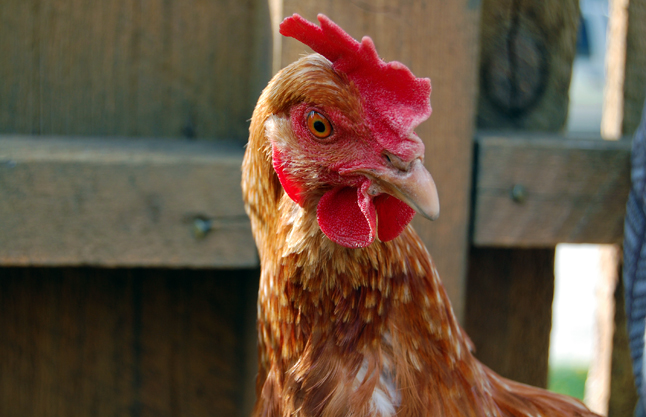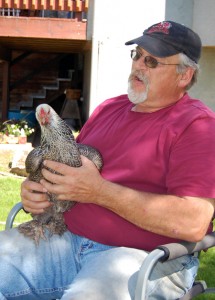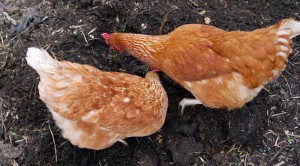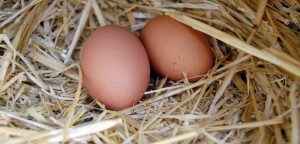
By David F. Rooney

Prowl the back lanes and you might hear their gentle cries. Yes. They’re birds. But, no, they’re not your usual urban fowl — they’re free range,
organic chickens and they’re probably here to stay.
“I’d say there are probably about 20 or 30 (chicken farmers) in town,” says Bob Melnyk, the beefy grand daddy of Revelstoke’s urban chicken farmers. If anybody has a handle on chicken farming within city limits it’s Bob.
“He’s The Chicken Man,” giggled his wife, Melanie.
It’s as good and accurate a handle as any. The Melnyks still live on land his family started farming more than 70 years ago and Bob maintains about 20 hens — his “ladies,” as he likes to call them — in a chicken coop in his backyard. Okay. They’re all legal egg layers because that part of Southside was not incorporated into the city until 1981 and the Melnyks had chickens — and even a few cows — at the time so they were all grandfathered in by law.
Bob’s got a pretty good idea how many underground chicken ranchers there are because eventually most will contact him looking for chickens or advice.
No surprise there. Who else are they going to contact? City Hall? Not likely.
“We get two or three complaints a year but I have no idea how many are actually out there,” says Bylaw Enforcement Officer Tim Luini.

About the only time he finds illicit chicken farmers is when some neighbour, who may be envious or irritable or simply malicious, drops a dime on them.
“Someone called Tim and laid a complaint against me,” said one urban peasant who shall remain nameless. “I have no idea why.”
Well, they might have been clucking at too-early an hour. Most of the people who are raising chickens in backyard coops don’t have roosters — “I really don’t need any of that cock-a-doodle-do stuff, said another chicken rancher — but even hens that are normally gentle cluckers can get a little boisterous when the sun comes up.
“Listen to them,” said the urban peasant as her chickens gently clucked and scratched through a freshly tilled garden looking for worms bugs and other protein snacks. “They’re so sweet!”
And they’re efficient, too. Melnyk swears by them.
“They’ll eat all the bugs in your garden and all the weeds,” he said.
Each hen will also, if properly cared for and provided with enough light in the winter, yield an egg a day. That may not sound like a lot but consider

than a dozen fresh, organic free-range eggs can cost $4 or more and do the math… Hmm… two chickens… 365 days in a year = 730 eggs or about 61 dozen. That’s worth at least $244. Electricity for a light in the coop and a few other things will run you perhaps $10 or $20 for the year so you have saved… what? $220 or so? And think of how much better those eggs will taste than the pathetic eggs laid by all those factory hens that are fed antibiotics, cardboard tasting feed and God-knows-what like dead animals.
It’s no wonder more and more people are thinking of becoming guerrilla chicken farmers.
And it may be about to get easier to do that. City Planner John Guenther said the Unified Development Bylaw that is slowly working its way through the municipal government could make it possible for all those underground chicken farmers to come out of the coop as it were.
“People should be able to raise a few chickens,” says Bob Melnyk. “You have to do it responsibly and keep them clean and safe but when you do that it shouldn’t be problem for anyone.”
Of course, there is another argument against urban chicken farming, especially in Revelstoke where the issue of bear attractants is an important one.
Bear Aware Coordinator Penny Page Brittin characterizes backyard chicken operations as “bear attractants” and notes that there have been more that a few bears destroyed over the last several years because they were attracted to backyard coops.
But Melnyk waves that criticism off.
“We’ve never had a bear show any interest in our chickens,” he said. “If you want to know what the top predator is for chickens, I’ll tell you. It’s dogs. Specifically huskies or husky crosses.”
Melnyk has lost his share of birds to dogs that have been allowed to roam freely by misguided owners.
Melanie described one incident in their coop as “a slaughterhouse… a blood bath” that left them sickened. But the Melnyks are, if anything, resilient and kept on going.
But Bob doesn’t take chances anymore. He nicely but firmly warned one neighbour that if his dog ever came on his property he’d kill it.
“It’s my land and these are my birds,” he said.
It’s also about environmental choices and a relationship with the past.
“I’m not a raving environmentalist,” Melnyk said. “But I like having the chickens around. They take care of things here — table scraps (except meat), weeds, bugs, you name it. And they’re good little ladies.”
They’re also a link to Bob’s past and a time when his family owned land that stretched right down to the river. Well, they owned it right up until the day BC Hydro bulldozed their fences and scattered their cattle and horses to they could build the dyke that now parallels the greenbelt.
“A lot of people who lost their farms and moved to town back then just closed the door on that period of their lives,” he said. “Not me. I look out the back and I see land that once belonged to my family.”
The chickens are his touchstone, a living link with his past.



